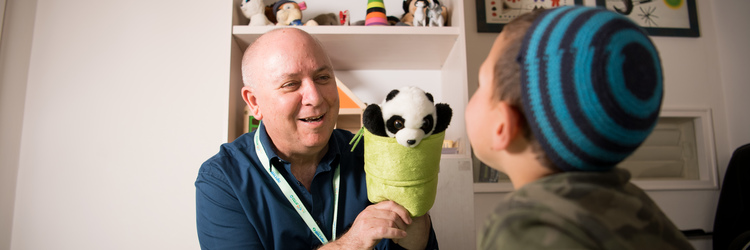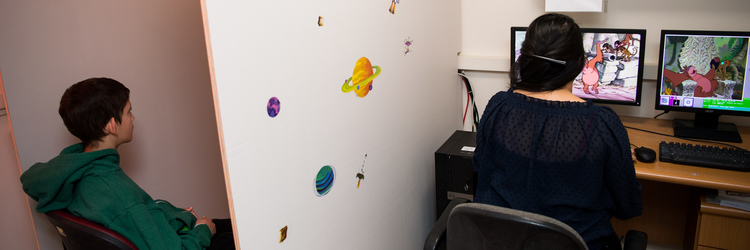Like most kids, Ilan Dinstein played rock-paper-scissors to see who got to ride shotgun or control the TV remote. He never imagined, however, that he would one day use the iconic hand game as part of an experiment to test our understanding of Autism Spectrum Disorder (ASD).
Dinstein, a professor of psychology and neuroscience at Ben-Gurion University, entered the field of neuroimaging at a time when ASD was attributed to a dysfunction of the human mirror-neuron system, thought to play a central role in our ability to perceive the movements and intentions of others. While still a PhD student at New York University, he asked adults with and without ASD to play rock-paper-scissors while he recorded their brain activity. Using MRI, he examined whether their mirror-neuron brain areas responded differently.
They did not: Individuals with autism exhibited the same responses in mirror-system areas as those without. But for Dinstein, that wasn't the most interesting takeaway. “The experience taught me that what we call 'autism' is in fact a variety of disorders, whereby different individuals exhibit a wide variety of symptoms and differences in brain structure and function. Looking back, it didn't make sense that we had ever expected all our autistic subjects to have the same underlying cause."
For Dinstein, this was a definitive moment: the point at which he decided to shift his work from basic to translational science, and focus on measuring the efficacy of interventions and symptom severity. “I wanted to do work that would have a direct impact on clinical care," he says. “My goal was and remains identifying which solutions work best for specific individuals. I want to be part of the movement called precision medicine for ASD."

Data that Integrates Disciplines
Ten years later, that determination to improve clinical care for autism through up-to-date scientific evidence is the guiding principle behind the Azrieli National Centre for Autism and Neurodevelopment Research (NARCI), a unique research-and-clinical care model Dinstein founded together with Dr. Gal Meiri, head of the Preschool Psychiatry Unit at Soroka University Medical Center (SUMC), Prof. Idan Menashe, an expert in epidemiology and genetics, Prof. Hava Golan, an expert in Molecular Biology, and additional BGU researchers and SUMC clinicians from a range of fields. “I came to BGU because it's the only Israeli university located right across the street from a major medical center, and I knew that for autism research to succeed, it would need to be integrated into the spaces where autism is treated and diagnosed," says Dinstein. When, several years later, SUMC granted NARCI staff 13 rooms inside the medical center, that integration became a full-fledged partnership.
In 2018, the data they collected—including genetic samples, MRI scans, behavioral assessments, parent questionnaires, and more—formed the basis of the National Autism Database, the cornerstone of the NARCI mission. Currently containing information on more than 1,200 children with autism and their families, the database allows scientists and clinicians from various fields to relate different types of data, such as associating specific genetic profiles with particular alterations in brain development. “Because autism is so heterogeneous, clinicians need a large amount of data—on each child, and on children with autism in general—to explain what they're seeing and connect it to the right intervention," Dinstein says.
Since 2018, NARCI has expanded its data collection through partnerships with three additional medical centers, one in Rishon Letzion and two in Beer-Sheva; together, these partnerships have doubled NARCI's data-collection capabilities. Thanks to a gift this past June from the David and Laura Merage Foundation, NARCI also partnered with ALUT, the largest autism-services organization in Israel, to create “smart" autism daycare centers. Equipped with audio-visual technology, the centers allow researchers to track both children's behavior and autism symptoms to determine improvement over time. The collected data will be integrated into the national database, a repository of data with the potential to answer clinical questions of urgent importance to the ASD field.

Encouraging Better Sleep
For many parents of children with autism, however, there is little more urgent than a six-hour stretch of sleep. According to a 2019 study — one of the largest to investigate the prevalence of sleep problems in autism — nearly 80 percent of autistic preschoolers have disrupted sleep; moreover, sleep problems are more than twice as common among children with autism as they are among typical children. “Sleep problems are among the most pressing concerns for families grappling with autism. Unfortunately, they are also among the least-studied aspects of the disorder, and the least-treated aspects, as well," Dinstein says. “In Israel in particular, there are very few services for parents struggling with this issue."
That is, until now. In what is one of NARCI's first intervention studies — and the first-ever intervention study on the subject in Israel — researchers combined quantitative and qualitative data to determine the efficacy of a targeted behavioral therapy. Leading the project is sleep consultant and behavioral insomnia specialist Alona Molch Haimovich, a BGU PhD student at NARCI. Molch Haimovich uses a wearable tracker with an accelerometer sensor to measure children's sleep for a week prior to and after the intervention itself. In between, she meets with parents for two workshops that focus on appropriate sleep hygiene for children with autism, as well as ways to reduce tension surrounding the “sleep ceremony" and to wean children off external support in falling asleep. “While many of the techniques may sound familiar to parents of non-autistic children, in the case of autism, routine is critical, and you can never get too granular," says Molch Haimovich. “For some autistic children, for example, the concern over when one parent will leave and the other take over the bedtime routine is so distracting, the effects of the routine are lost. Our intervention brings all our scientific and clinical knowledge of autism to bear on the problem."
And for many parents in the study's first cohort, the intervention was nothing less than a solution. “Initial post-intervention data suggest that in many cases, sleep issues had greatly improved, and in some cases had even been resolved. I get WhatsApps from parents who call the program 'life saving,'" she says. “It's incredibly gratifying to see the impact this research has on the community that needs it most."
Along with recruiting the next cohort of what will be a 100-family study, NARCI is also developing a Hebrew toolkit for parents of autistic children that includes instructions and suggestions on how to promote good sleep hygiene and bedtime routines through pictures, which many autistic children find easier to use than words. The toolkit will be available to everyone at no cost.
.jpg)
It Takes a Country
“If I once thought that effective autism research needed a university and a medical center, I now realize it needs municipalities, national autism-service nonprofits like ALUT and Children at Risk, government agencies, and every type of other partner, too," Dinstein says. Along with the expansion of its database, NARCI also plans to conduct large-scale research with the city's ASD community in a soon-to-be-built Family Autism Center, the result of a collaboration with the Beer-Sheva Municipality. “We have an incredible opportunity to use science to improve autism therapy. The result is a win-win partnership for every institution that delivers autism services in Israel, and every autistic child and their family. What," wonders Dinstein, “could be more important than that?"
